

Three critical minerals - gallium, germanium, and antimony - have been banned from being exported to the United States by China in an escalation of trade tensions. The decision, unveiled on December 3, 2024, comes just a day after Washington imposed new restrictions targeting China’s semiconductor sector, signalling an intensifying rivalry between the world’s two largest economies.

Gallium is primarily sourced as a byproduct of mining and refining other metals, especially bauxite, although some gallium is also derived from the processing of sphalerite ore for zinc. Germanium largely occurs as a geochemical substitute in various sulfide minerals, primarily in the mineral sphalerite (ZnS), with minor inclusion in silicate minerals. Stibnite (Sb2S3) is the predominant ore mineral of antimony. The most important use of antimony metal is as a hardener in lead for storage batteries.
Gallium and germanium play a crucial role in semiconductor manufacturing, with germanium also being essential for infrared technology, fibre optic cables, and solar cells. Meanwhile, antimony is a key component in ammunition and weaponry, while graphite, due to its high energy density and conductivity, constitutes the largest volume component in electric vehicle batteries.
The Chinese Ministry of Commerce cited national security concerns as the primary reason for the ban, underscoring the dual-use nature of these minerals, which have both military and civilian applications. Gallium, germanium, and antimony are essential in advanced technologies, including military equipment, communications, and renewable energy, making the move a strategic blow to U.S. industries reliant on these imports.
The ministry stated, “In principle, the export of gallium, germanium, antimony and superhard materials to the United States shall not be permitted.”
This latest directive builds upon export restrictions introduced last year but narrows its focus exclusively to the U.S. market. In addition to the mineral export ban, Beijing has also mandated stricter oversight on the export of graphite items to the U.S., further tightening controls over resources crucial to high-tech manufacturing.
The timing of the announcement is notable, coming just weeks before U.S. President-elect Donald Trump is set to take office, potentially setting the stage for heightened trade tensions early in his administration. Analysts suggest this move could provoke a strong response from Washington, deepening the economic standoff and raising concerns about the future of U.S.-China trade relations.
As both nations vie for technological supremacy, this latest development highlights the growing strategic importance of critical minerals in global geopolitics and the potential ripple effects on global supply chains.
The move has raised fresh concerns that China might next target other critical minerals, particularly those with broader applications, such as nickel and cobalt.
China's announcement follows Washington's latest crackdown on its semiconductor industry—the third in three years—imposing export restrictions on 140 companies as of December 2, 2024.
Escalating retaliation
On December 3, 2024, multiple Chinese industry groups urged their members to prioritise purchasing domestically produced semiconductors, with one group claiming that U.S. chips are no longer safe or reliable. This recommendation could impact major U.S. chipmakers who, despite facing export restrictions, have continued to sell products in the Chinese market.
Peter Arkell, Chairman of the Global Mining Association of China, said, “It comes as no surprise that China has responded to the increasing restrictions by American authorities, current and imminent, with its own restrictions on the supply of these strategic minerals.”
“It’s a trade war that has no winners.”
Image credit: Techspot
Information credit: Aljazeera



Responses






